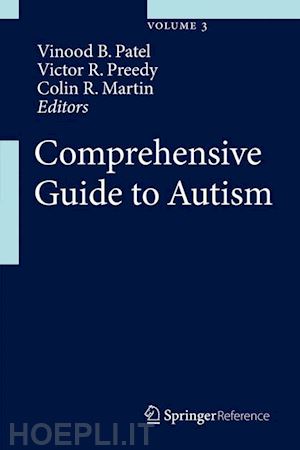
Questo prodotto usufruisce delle SPEDIZIONI GRATIS
selezionando l'opzione Corriere Veloce in fase di ordine.
Pagabile anche con Carta della cultura giovani e del merito, 18App Bonus Cultura e Carta del Docente
Autism is a complex multifaceted disorder affecting neurodevelopment during the early years of life and, for many, throughout the life span. Inherent features include difficulties or deficits in communication, social interaction, cognition, and interpersonal behavioral coordination, to name just a few. Autism profoundly impacts the affected individual, the family, and, in many cases, the localized communities. The increased prevalence of childhood autism has resulted in rapid developments in a wide range of disciplines in recent years. Nevertheless, despite intensive research, the cause(s) remain unresolved and no single treatment strategy is employed. To address these issues, Comprehensive Guide to Autism is an all-embracing reference that offers analyses and discussions of contemporary issues in the field of autism. The work brings together scientific material from leading experts in the field relating to a wide range of important current topics, such as the early identification and treatment of children with autism, pertinent social and behavioral studies, recent developments in genetics and immunology, the influence of diet, models of autism, and future treatment prospects. Comprehensive Guide to Autism contains essential readings for behavioral science researchers, psychologists, physicians, social workers, parents, and caregivers.
Section i: diagnosing autism spectrum disorders.- section ii: behavioral issues in autism spectrum disorders.- section iii: learning issues in autism spectrum disorders.- section iv: social issues in autism spectrum disorders.- section v: principal factors and contributing mechanisms in the pathophysiology of autism.- section vi: immunology of autism spectrum disorders.- section vii: genetics of autism spectrum disorders.- section viii: models of autism.- section ix asperges syndrome and adult autistics .- section x: treatments in autism.
Dr Vinood B. Patel is a senior lecturer in clinical biochemistry at the University of Westminster and honorary fellow at King’s College London. He directs studies on metabolic pathways involved in liver disease, particularly related to mitochondrial energy regulation and cell death. Other areas include understanding behavioral and mental health problems in neurological disorders. Dr Patel is a nationally and internationally recognized alcohol researcher and was involved in several NIH funded biomedical grants related to alcoholic liver disease. Dr Patel has edited several biomedical books and has published over 150 articles. Professor Colin R. Martin is chair in mental health at the University of the West of Scotland and adjunct professor at the Royal Melbourne Institute of Technology, Melbourne, Australia. Professor Martin is a chartered health psychologist and a chartered scientist. He has published many scientific papers in psychology, biology, medical, and nursing journals. Professor Martin is honorary Consultant Psychologist to The Salvation Army, UK and Eire Territories and was instrumental in formulating the addictions policy of the Salvation Army (UK and Eire) over recent years to develop high quality and evidenced-based clinical care and services. Professor Victor R. Preedy is a professor in the School of Medicine, King's College London. He directs studies regarding pathology, health, nutrition, and toxicity. Professor Preedy has published over 550 articles, which includes over 160 peer-reviewed manuscripts based on original research and 90 reviews as well as 35 books.











Il sito utilizza cookie ed altri strumenti di tracciamento che raccolgono informazioni dal dispositivo dell’utente. Oltre ai cookie tecnici ed analitici aggregati, strettamente necessari per il funzionamento di questo sito web, previo consenso dell’utente possono essere installati cookie di profilazione e marketing e cookie dei social media. Cliccando su “Accetto tutti i cookie” saranno attivate tutte le categorie di cookie. Per accettare solo deterninate categorie di cookie, cliccare invece su “Impostazioni cookie”. Chiudendo il banner o continuando a navigare saranno installati solo cookie tecnici. Per maggiori dettagli, consultare la Cookie Policy.